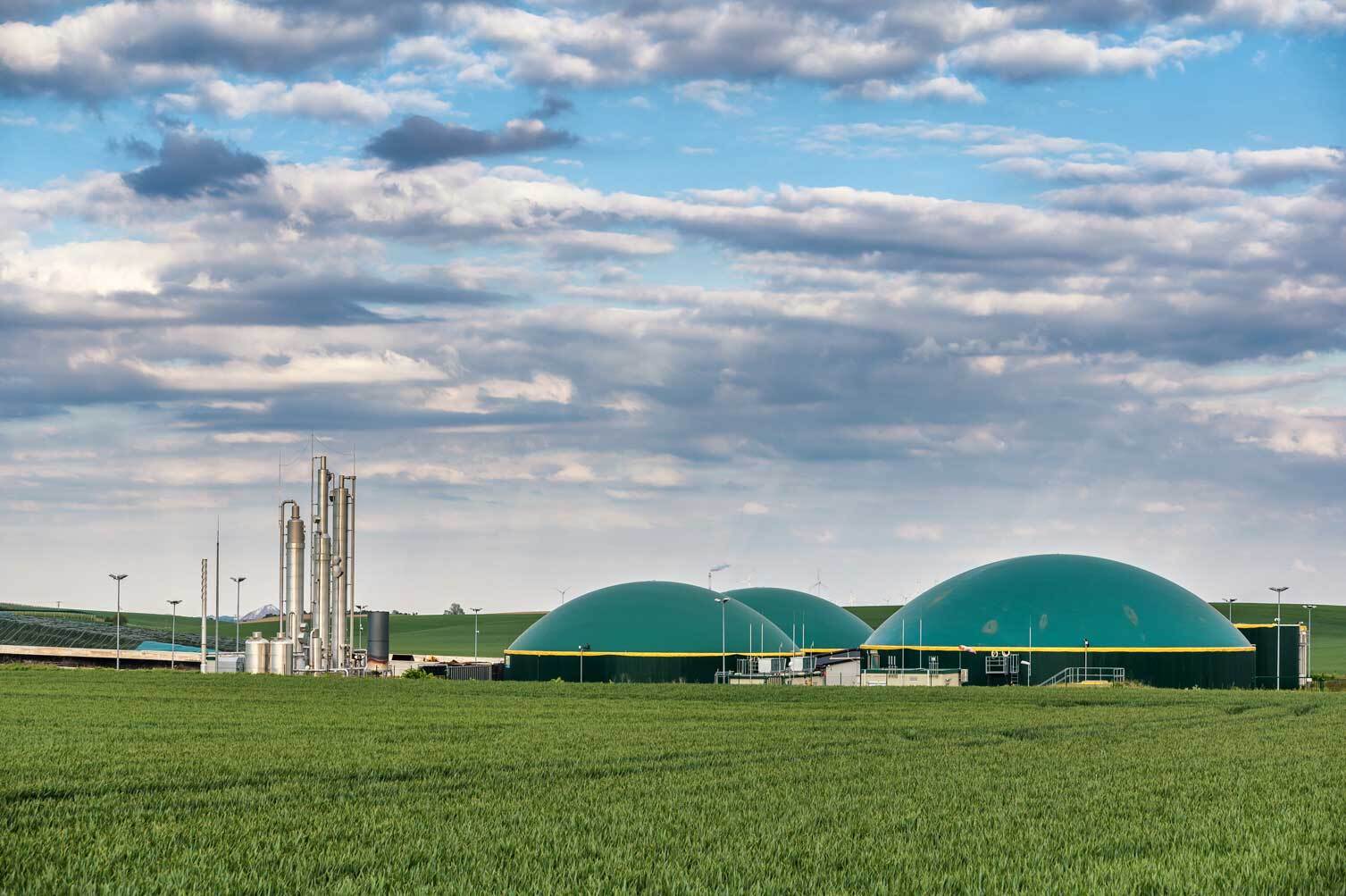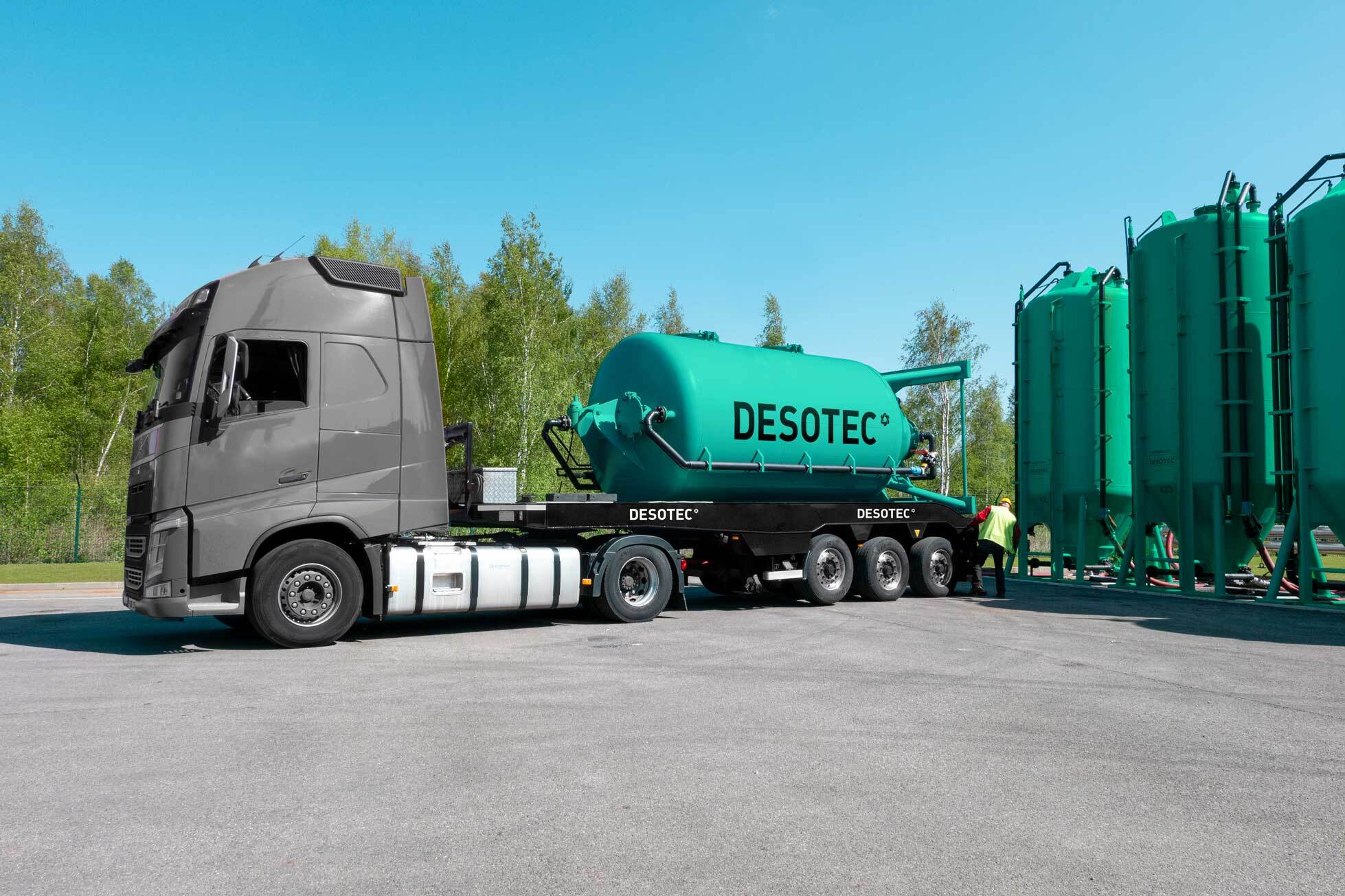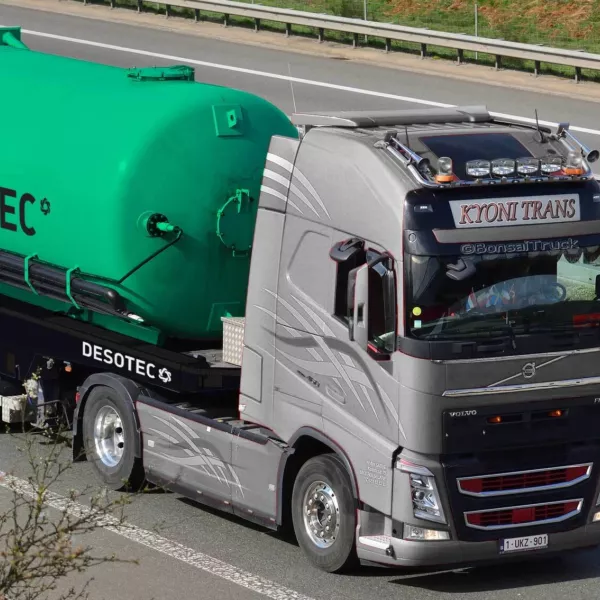Mobile vs fixed filters in the biogas market
Activated carbon technology is widely accepted as an effective filtration treatment in the biogas and biomethane markets. However, the advantages of mobile filters over fixed filters are less well known.
The role of activated carbon filtration in biogas and biomethane purification
Activated carbon filtration is widely used in the biogas and biomethane industries to remove hazardous and damaging contaminants from biogas and off-gases.
As an example, it can remove hydrogen sulphide (H₂S) and volatile organic compounds (VOCs) such as siloxanes and terpenes to avoid damaging equipment used downstream for heat and combustion generation or during the process of upgrading biogas into biomethane.


Typical challenges with fixed filters
Many biogas plants, particularly in France, are small in scale: for example, those built at agricultural sites to convert farm by-products into green energy.
Biogas production may be a side line for these operators rather than their main focus. Before making a major investment in a fixed filtration system designed to last 15 years or more, they should consider the following common problems and associated hidden costs.
Incorrect dimensions: Fixed filters are dimensioned before a biogas plant has begun production, with calculations based on similar existing installations. If they prove incorrect, it is hard to adjust a fixed filter.
Changing parameters: In lengthy projects, criteria such as flow rates can change over time, meaning the fixed filter is no longer fit for purpose.
Changing feedstock: The composition of organic materials used for anaerobic digestion (AD) might also change, affecting the pollutants, in terms of concentration and mass flow, that require treatment. For example, if a group of farmers set up an anaerobic digester together, then the departure or addition of one member can alter the feedstock.
Unexpected pollutants: It is not always possible to predict which contaminants will be detected in a biogas stream. Operators of small-scale biogas plants may not know how to tackle unforeseen pollutants, and it may not be possible to adapt fixed filters.
Hotspots: Hotspots can form in the filter bed. When these are exposed to oxygen during the emptying of the fixed filters, they are a fire risk. Although such problems are rare, their likelihood increases if fixed filters are emptied by non-experts without the appropriate safety precautions.
Dust and hazardous waste: The process of emptying and refilling a fixed filter causes dust. This is harmful to health and requires specific operating precautions and personal protection equipment. Spent carbon can become hazardous although the threshold changes for different molecules. DESOTEC has a dedicated team who can answer questions about dust and hazardous waste.
Storage of spent carbon: Today, some biogas producers are still storing spent carbon as waste in big bags in the yard without any additional safety precautions for health and environment. Waste from biogas applications can be dangerous, especially if it contains large amounts of sulphur.
Disposal of spent carbon: In the coming years, waste regulations or disposal availabilities will be tightened. Biogas producers are required to obtain certification that they are transporting and disposing of spent carbon safely.
Maintenance issues: Fixed filters require regular maintenance to ensure a long-term efficiency. Failure to do so can lead to the filter becoming corroded, for example by H₂S or humidity.
If they become clogged, their efficiency will lower: the pressure drop will increase, and more energy will be needed to push the gas through the filter, raising costs.
Downtime: During the emptying, refilling and maintenance of fixed filters, production of biogas must cease, causing a loss of profits and damage to the environment through subsequent flaring. Emptying a filter requires renting a truck to suck out the contents, which can take around a day. Safety precautions must also be adhered to, which adds more time.
Advantages of DESOTEC mobile filtration solutions
DESOTEC offers a full-service solution based around mobile activated carbon filtration. This encompasses not only the filter units and carbon, but also engineering expertise and advice, exchange services, maintenance, and waste handling.
DESOTECs solutions have the following advantages over fixed filters for biogas producers.
Dimensioning
The DESOTEC system is modular, making it easy to optimise. If initial design calculations before operations reveal to be inexact, whatever the reason, or if processes change over time, it is simple to exchange the filter for a different size, add more mobile filters in series or parallel, or remove a filter.
Contaminants
DESOTEC engineers have extensive expertise and experience in dealing with a wide range of pollutants. When an unexpected molecule is detected, they can recommend how to deal with it: for example, by adapting the filtration set-up or changing the type of carbon inside the filter.
Filter exchange
It takes only around an hour to exchange a mobile filter, minimising downtime. It is carried out by our technicians.
Troubleshooting
With fixed filters, customers can struggle if problems arise. With mobile filters, DESOTEC engineers will investigate responsively on a 24/7 basis and recommend appropriate solutions to maintain an effective biogas production.
Maintenance and upgrading
After exchange, we inspect all mobile filters for potential signs of corrosion and clogging, and carry out repairs and cleaning where necessary.
From time to time, we upgrade our proprietary technology, for example replacing stainless steel filter units with polyethylene ones in certain circumstances. Our customers can be sure of getting the latest technology.
Waste handling
DESOTEC transports closed mobile filter units safely to our own facilities, eliminating dust issues from customers’ sites. DESOTEC technicians are fully trained and equipped to handle hazardous waste safely. We also deal with all paperwork, keeping fully abreast of changing regulations.
Waste storage
Waste carbon is taken back to DESOTEC facilities, where it is sampled and analysed to discover the loading and the recycling possibilities. Hazardous waste is stored in carefully controlled conditions.
Sustainability
Rather than dispose of spent carbon, we are able to reactivate much of it at our state-of-the-art facilities in Belgium and return it to customers for reuse, saving them money.
Contaminants are completely destroyed in line with national and European legislation.
DESOTEC steadily researches ways to further improve sustainability, e.g. by developing new carbon types made from renewable resources. We also work with customers on ways to optimise their system to reduce carbon consumption.
Dimensioning mobile filters
DESOTEC engineers work with clients to ensure that mobile filters are dimensioned correctly.
We need information about the likely or existing flow rate at the plant and the type of pollutants expected. Not only are the gas parameters key, but so are the operating conditions: the temperature, pressure, oxygen concentration and humidity of conditions.
We also ask customers how they propose to monitor and follow up their system, and how often. Bigger plants might invest in online follow-up, while smaller plants might measure emissions only once a month.
The ground footprint of DESOTEC mobile filters is small which is also important for sites where space is limited.
3 examples of mobile filters in action - case studies
1. At a wastewater treatment plant, two fixed filters were installed, each containing two tonnes of activated carbon, to handle a flow rate of 300 m³/h. However, contamination was four to five times higher than expected, so the fixed filter needed emptying and refilling every month.
The company has now installed a large DESOTEC mobile filter to bypass the original fixed filter versions. This requires exchange only once every nine to 10 months. Operational costs have dropped by 25%.
2. A fixed filter at a landfill site became clogged, reducing the amount of carbon it could hold by 30% and causing the pressure drop to increase. A DESOTEC mobile filter was installed upstream to remove the bulk of the pollution.
3. A fixed filter at a biomethane plant set up at an agricultural site turned out to be more sensitive to VOCs than first thought, requiring far more maintenance. A DESOTEC mobile filter was added to reduce the levels of VOCs in compliance with what was initially expected.
Our ERRC analysis
We recently conducted an Eliminate-Reduce-Raise-Create grid analysis (ERRC) and found that our solution has many advantages:
Eliminate
Avoids the customer from dealing with any on-site handling costs; waste treatment costs (as waste is recycled); extra services such as filter emptying; waste storage and disposal; extra services; and upfront investments.
Reduce
Dramatically reduces ownership costs and project risks.
Raise
Supports production by limiting downtime; flexibility to adapt to changing circumstances; safety and, of course; revenues.
Create
Mobile filter create closed-loop and strengthen sustainability.
How can DESOTEC help you?
DESOTEC’s team of engineers is available and keen to discuss how mobile filters could work at your biogas or biomethane plant. Contact us today.
Contact our expertsHow can DESOTEC help you?
DESOTEC’s team of engineers is available and keen to discuss how mobile filters could work at your biogas or biomethane plant. Contact us today.
Contact our experts-
Our unique service
Our closed-loop, full-service model is as unique as your business needs. We’ll define the right filtration setup and safely recycle filtration waste, making it easy to go green. -
Your sustainability journey
We care about protecting our air, water and soil for future generations, just like you. Our filtration solutions help you meet environmental standards, reducing your carbon footprint. -
Air & gas purification
Our sustainable filtration solutions ensure air purification, odour control, and high quality process gases such as biogas and biomethane.


